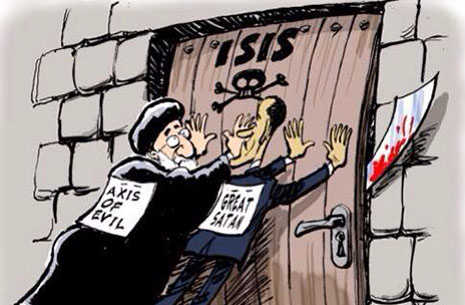U.S. President Barak Obama has set a difficult goal in the war against the Islamic State of Iraq and al-Sham (ISIS). “Our coalition isn’t just going to degrade this barbarous terrorist organization,” he said in mid-December, “we’re going to destroy it.” He reiterated this goal after ISIS’ killing of the Jordanian pilot Moath al-Kasasbeh. But to achieve that goal, he will need to bring Iran on board, especially in the Syrian peace talks.
The ISIS crisis is so complex because it links ideological and geopolitical conflicts across the region. The terrorist group, a non-state actor seeking to create an Islamic caliphate, is anti-nationalist, anti-state, and, indeed, against any known political borders whatsoever. It capitalizes on tensions in Iraq and Syria between Shias, Sunnis, and Kurds and, more broadly, between Iran, Turkey, and Saudi Arabia. This strategy has allowed ISIS to stay alive. And the U.S.-led coalition against the group will only add to the differences, especially between Iran and Saudi Arabia, the region’s two main players. As a matter of reality in the region, then, the preservation of international security—the goal of the coalition against ISIS—cannot come at the expense of any state’s security and interests.
Indisputably, the international coalition against ISIS has been able to weaken the terrorist group. Yet, as the coalition’s focus shifts from military tactics to a political solution, the United States’ role at the head of the table will stand in the way of progress. Understanding as much, each regional actor has developed its own specific strategy for containing the ISIS threat. Iran is suspicious of the coalition’s air operations, which include some Arab rival states operating over Iraqi territory and beyond. Turkey is worried that the conflict could diminish Turkey’s regional political and economic role and empower Kurds at Turkey’s expense. Saudi Arabia mainly aims to restrain ISIS, which presents an ideological challenge to the government, and to weaken the Bashar al-Assad regime to constrain Iran’s regional role.
In such circumstances, regional states will have to compromise on their maximalist positions for the sake of comprehensive regional security. They have done so before. They worked together on the critical issue of Syrian chemical weapons disarmament and even assembled the Geneva peace conferences for the war in Syria. But here, Iran, which has typically been left out, must be included, specifically in the Geneva peace conference. Previous post-conflict experiences in the region—in Tajikistan in the 1990s, in Afghanistan in 2001, and in Iraq after 2003—all show that no regional settlement that doesn’t include all concerned actors—and strike a balance between individual states’ interests and regional security—will be successful.
Regional states will have to compromise on their maximalist positions for the sake of comprehensive security.
Iran has lots of experience in successful post-conflict management in Afghanistan, Lebanon, and Iraq. The country has helped build coalitions, an example of which is Iran’s role in the recent political settlement in Iraq that led to the replacement of Prime Minister Nouri al-Maliki. Further, Iran has unique influence on other key actors in the crisis, such as Russia. Most importantly, the Rouhani government, which seeks to moderate Iran’s foreign policy, has the necessary political motivations for solving the Syrian crisis. These all enable the country to play a constructive role in the region.
But, for Iran to be successfully integrated in the Syrian peace talks, the negotiators have to realize that their policy that Assad must go cannot be a precondition to any settlement. Assad’s ouster would increase Iran’s geostrategic losses compared to its rivals and make the country less willing to make concessions of its own. If accommodations can be made for Iran, Iran will be more accommodating with other nations in settling the Syrian crisis.
It is obvious that Syria will not return to its pre-conflict status. The issue now is how to convince Iran’s security and political elites of the benefit of a political transformation in Syria. This is likely to happen only during a process of peace talks. Iran has recently endorsed the UN Syria envoy Steffan de Mistura’s “freeze” plan, which calls for step-by-step confidence-building measure in Syria’s volatile political environment. This latest peace plan aims to make peace workable from the local level (the city of Aleppo) to the national level, thereby increasing the chances that Syria’s various political forces can reach a political solution.
With good diplomacy, the ISIS issue, as a common challenge, has the potential to advance cooperation between Iran and the United States. Initial confidence-building measures in Syria could even be beneficial for the nuclear talks, given that, even in the aftermath of a possible comprehensive deal, the two sides need to closely work together. This, in turn, can provide the ground for developing a regional counterterrorism strategy.
Destroying ISIS, as Obama has vowed, requires developing a regional counterterrorism strategy in which states work together. Such cooperation should also be supported and guaranteed by the United Nations’ mediatory efforts. ISIS has emerged and spread in ungoverned areas of Syria and Iraq. Battling it, therefore, needs to involve strengthening states. The U.S. led international collation against ISIS has led the individual states to follow their own policies. But that will give ISIS even more space to operate. As such, only a multilateral strategy, based on collective effort and comprehensive security, and not on the balance of power, will be able to destroy ISIS.
More about:
















































